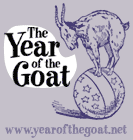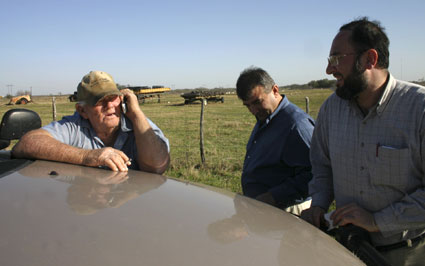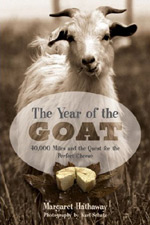There were three or four Muslim men at the auction, distinguishable from the other bidders by their pressed slacks and shirts, loafers, and bare heads. They were scattered in the armchairs of the auction ring's first rows among flannel clad cowboys and heavily made-up women; everyone, including the Muslims, was chain smoking. (Everyone, that is, except Levent, who explained that he quit smoking when he got married so that he wouldn't annoy his wife.)
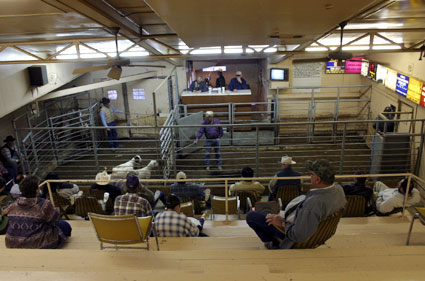 |
| Junction Auction - enlarge photo |
They had a tip from someone at the auction that there was a man in Uvalde, about one hundred miles to the south, who had 30,000 head of goats, and might be willing to deal directly with Al Marwa, instead of sending the animals through auction. In the coffee shop, where the waitress offered a horrified Levent a pork chop, they called the man from a cell phone and made an appointment to meet him later in the afternoon. We asked if we could tag along, and they agreed, recommending that Karl drive the lead car so that they wouldn't speed and inadvertently lose us. We reached Uvalde in about an hour and a half, calling from a service station to get directions to the ranch. Driving the county road, we passed several fields of goats: Spanish, Boer, Angora, and obvious crosses. This was definitely goat country.
When we got to the ranch, it turned out Levent had been misinformed. Dink Turner, a weathered rancher with decades of experience in the goat industry, had sold most of his herd, and at present kept only about three hundred goats. Of those, less than one hundred would satisfy the criteria that Al Marwa needed to fill; either the animals were too small, too large, too bred, or too castrated for the Id al Adha market. After calling some other Uvalde ranchers recommended by Dink, none of whom had the goats to fill their needs, Levent and Yuksol thanked him and got back on the road, discouraged.
Before they left the Turner Ranch, we had arranged to see them again the following day at Producers Livestock Auction in San Angelo, where they hoped to have better luck. Producers holds the largest sheep and goat auction in the country, with close to half a million animals passing through their ring each year. In the past eight years, goats have jumped from comprising sixteen percent of these sales to now making up half of them. On this Tuesday morning, 9,500 goats and sheep were slated for auction.
The auction house was by far the most sophisticated we'd visited; the building itself looks more like a high school or community center, with couches and wood-partitioned phone booths in the main hall, an upstairs level with conference rooms and offices, and to the left, Stockman's Cafe, a reasonably priced restaurant with fresh, hearty food and cheerful service. The auction ring, which is situated to the right of the hall, is spacious, with comfortable seats, plenty of leg room, and, next to each chair, a tin can for cigarette butts and spit. There are closed phone booths lining one wall, and through a door, the stockyards--which stretch as far as the eye can see, spanned with an extensive network of catwalks, and efficiently organized so that each group of animals is herded from the farthest corner into the ring--can be reached.
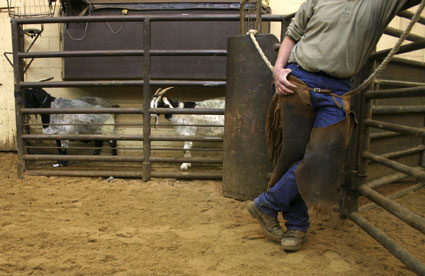 |
| Judas Goats - enlarge photo |
The buyers were much the same as the day before, though there were two or three times as many. As at Junction, there were a couple who seemed to buy as many animals as they could, while others were careful, asking the handlers (who were wearing chaps!) to pull out various animals so that they could get a better look. There were several other Muslims at the auction, some bidding vigorously, and some waiting, as Al Marwa was, until the animals were gathered in larger lots, which seemed to lower the price.
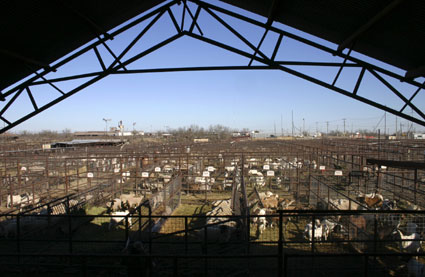 |
| The stockyards - enlarge photo |
Standing on the catwalk, we were able to look down on the proceedings, as handlers moved goats and sheep down the chutes between pens, waving a Walmart bag on the end of a long stick to get their attention. Some goats hopped over each other and tried to climb onto each other's backs; the sheep, for the most part, scurried nervously and then huddled into a corner of their pen.
In such an organized format, and in such great numbers, goats for the first time became livestock to us, distinguishable from cattle merely by size. The goat industry, which before had seemed a somewhat nebulous idea, was before us, mapped on the grid of the stockyards. It was incredible, and somewhat overwhelming.
Inside, Levent and Yuksol had begun bidding, and by the end of the afternoon, they bought about three hundred animals. Though they had only bought half of their projected number, they seemed happy with the purchase, and, when we left them that evening, had begun searching for a truck to bring them to their plant in Pennsylvania.
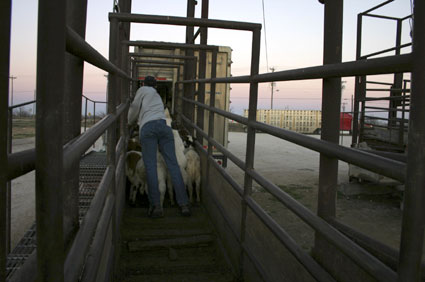 |
| Loading the goats - enlarge photo |
Wednesday morning we had an appointment to speak with Benny Cox, the goat and sheep manager at Producers. When we arrived at eight, Levent and Yuksol were in the Stockman's Cafe, drinking coffee and eating cookies, since the griddle had been used to fry the morning's ham and bacon. Benny had postponed our appointment because he was trying to arrange a trailer for Al Marwa, so we joined Levent and Yuksol for coffee.
Since they left Producers on Tuesday evening, Levent said, they had been constantly on the phone, trying to find a truck, and at one point even going to a motel where truckers are known to stay, leaving notes on the windshields of empty trailer cabs. Levent and Yuksol were flying out of San Antonio at five, and they were getting anxious because if no one could be found to transport the animals, they would be stuck trying to resell them from a distance at the next auction.
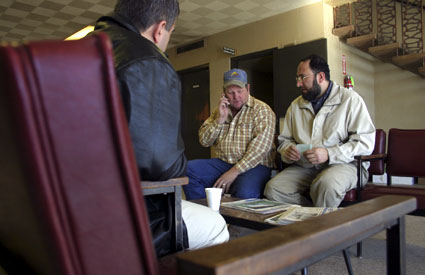 |
| Calling for a truck - enlarge photo |
